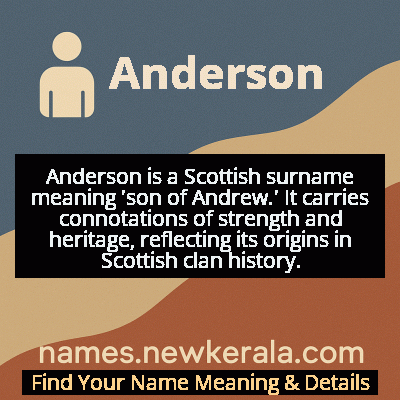Anderson Name Meaning & Details
Origin, Popularity, Numerology Analysis & Name Meaning of Anderson
Discover the origin, meaning, and cultural significance of the name ANDERSON. Delve into its historical roots and explore the lasting impact it has had on communities and traditions.
Name
Anderson
Gender
Male
Origin
Scottish
Lucky Number
9
Meaning of the Name - Anderson
Anderson is a Scottish surname meaning 'son of Andrew.' It carries connotations of strength and heritage, reflecting its origins in Scottish clan history.
Anderson - Complete Numerology Analysis
Your Numerology Number
Based on Pythagorean Numerology System
Ruling Planet
Mars
Positive Nature
Generous, passionate, energetic, and humanitarian.
Negative Traits
Impulsive, impatient, moody, and can be overly emotional.
Lucky Colours
Red, maroon, scarlet.
Lucky Days
Tuesday.
Lucky Stones
Red coral, garnet.
Harmony Numbers
1, 2, 3, 6.
Best Suited Professions
Military, sports, philanthropy, leadership roles.
What People Like About You
Courage, energy, leadership, generosity.
Famous People Named Anderson
Hans Christian Andersen
Author
World-renowned fairy tale writer whose stories have been translated into 150+ languages
Pamela Anderson
Actress and activist
Global television icon and prominent animal rights advocate
Wes Anderson
Film director
Oscar-winning director known for his highly distinctive visual storytelling style
Marian Anderson
Opera singer
First African American to perform at the Metropolitan Opera, breaking racial barriers
Name Variations & International Equivalents
Click on blue names to explore their detailed meanings. Gray names with will be available soon.
Cultural & Historical Significance
In Scandinavian countries, the Andersen/Andersson variations became among the most common surnames, reflecting the name's adaptability across Nordic cultures. The name carries associations with the Scottish Enlightenment values of education, innovation, and civic responsibility. Famous Andersons across various fields—from literature to science to entertainment—have reinforced the name's connection to achievement and cultural contribution. Today, Anderson serves as a bridge between Scottish heritage and global modernity, representing both traditional values and contemporary success across diverse fields and cultures worldwide.
Extended Personality Analysis
The name Anderson is commonly associated with a personality profile characterized by strength, reliability, and intellectual curiosity. Individuals with this name are often perceived as natural leaders who combine practical wisdom with creative thinking. The Scottish origins suggest traits of resilience, determination, and loyalty—qualities that served clan members well in Scotland's challenging historical landscape. There's also an element of quiet confidence and competence, with Andersons typically seen as people who get things done without unnecessary drama.
Beyond the Scottish characteristics, the name carries elements of innovation and artistic sensibility, influenced by prominent Andersons in creative fields. This creates a balanced personality profile that values both tradition and progress. Andersons are often viewed as trustworthy individuals who honor their commitments and maintain strong family connections. The name suggests someone who is both grounded and capable of visionary thinking—able to appreciate heritage while embracing new ideas and opportunities. This combination makes the Anderson personality both stable and dynamic, equally comfortable in traditional settings and innovative environments.
Modern Usage & Popularity
In contemporary usage, Anderson maintains strong presence as both a surname and given name across the English-speaking world. As a surname, it consistently ranks in the top 20 most common names in the United States, United Kingdom, Canada, and Australia, demonstrating its enduring popularity. The given name Anderson has seen significant growth since the 1990s, particularly appealing to parents seeking names with strong heritage connections that feel both traditional and fresh. It's especially popular in the American South and among families celebrating Scottish ancestry. The name works well across diverse contexts—from professional environments to creative fields—and has gained international appeal through global media and celebrity associations. Recent years have shown increased usage in Latin America, particularly Brazil, where it's viewed as modern and cosmopolitan while retaining its strong etymological roots.
Symbolic & Spiritual Meanings
Symbolically, Anderson represents the powerful connection between individual identity and ancestral legacy. The 'son of Andrew' construction inherently symbolizes continuity, inheritance, and the passing of values through generations. Andrew's meaning of 'manly' or 'warrior' adds layers of strength, protection, and courage to the symbolic profile. The name embodies the concept of building upon foundations—honoring one's heritage while creating something new and meaningful. It suggests stability and endurance, much like the Scottish landscapes and stone structures that characterize its origin region. Anderson also symbolizes reliability and trustworthiness, representing the dependable foundation upon which relationships and communities are built. The Scandinavian variations introduce elements of innovation and design thinking, creating a rich symbolic tapestry that beautifully balances tradition with forward-looking progress and adaptability.

